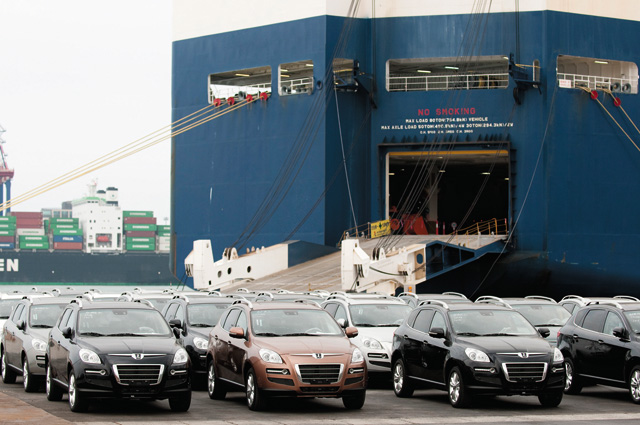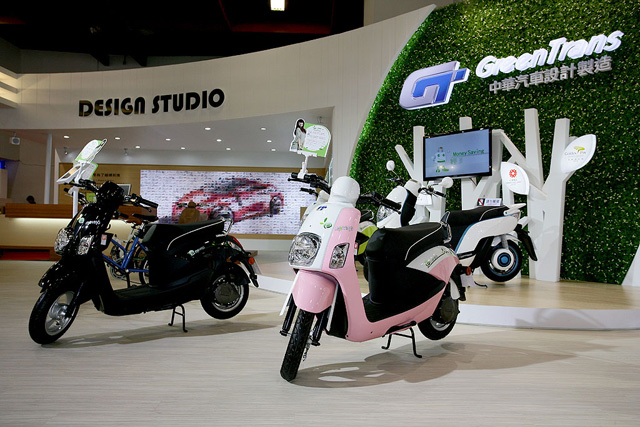Taiwan's Auto Vehicle Production Value Climbs 11.7% YoY in Q2
2012/11/02 | ByWith increased car exports that offset sagging local new-car sales, Taiwan's auto or transportation vehicle industry production value, including assembled vehicles, auto parts, powered two-wheelers (PTWs), and electric vehicles (including locally-produced Toyota Camry hybrids and electric scooters), grew 3.2% quarter-on-quarter (QoQ) and 11.7% year-on-year (YoY) to NT$107.63 billion (US$3.6 billion) in the second quarter of 2012 (first quarter: NT$100.68 billion or US$3.36 billion), according to the Industrial Economics & Knowledge Center IEK-ITIS (Industry & Technology Intelligence Services) in Taiwan.
Assembled Vehicles
The value of vehicles produced in Taiwan in the second quarter, including mid-sized and compact passenger cars, large passenger cars, light trucks, passenger and commercial vehicles, and heavy-duty trucks/buses, increased 10% QoQ and 24% YoY to NT$49.3 billion (US$1.64 billion) (first quarter: NT$43.8 billion or US$1.46 billion). In the second quarter, some 18,000 Taiwan-assembled cars were exported, mainly through local automakers' foreign technical partners in Japan, up 13% QoQ. New-car sales in Taiwan, however, were compromised by sluggish economy and rising fuel prices in the second quarter.
Value of Transportation Vehicle Production in Taiwan | ||||||||||
| Q211 | Q311 | Q411 | Q112 | Q212(e) | QoQ | YoY | Q312 | 2010 | 2011 |
Assembled | NT$39.8 B. | NT$50.2 B. | NT$50.4 B. | NT$44.8 B. | NT$49.3 B. | 10.0% | 23.9% | NT | NT | NT |
Auto Parts | NT$43.9 B. | NT$47.5 B. | NT$48.7 B. | NT$48.9 B. | NT$46.6 B. | -4.7% | 6.2% | NT | NT | NT |
PTWs | NT$13.7 B. | NT$13.7 B. | NT$9.9 B. | NT$10.5 B. | NT$11.7 B. | 10.8% | -7.5% | NT | NT | NT |
EV | NT$164 M. | NT$212 M. | NT$165 M. (e) | NT$1.8 B. | NT$2.9 B. | 61.1% | 1680% | NT | NT | NT |
Total | NT$96.3 B. | NT$111.5 B. | NT$109.0 B. | NT$104.3 B. | NT$107.6 B. | 3.2% | 11.7% | NT | NT | NT |
Source: IEK-ITIS, Aug. 2012. | ||||||||||
Auto Parts
Production of original equipment (OE) auto parts saw minor increase in the second quarter driven by demand from local automakers, with aftermarket (AM) parts production, the major exports from the island, unaffected by seasonality factors. The overall auto parts production value dropped 4.7% QoQ but increased 6.2% YoY during the period to NT$46.6 billion (US$1.55 billion), driven mainly by exports to China, suggesting positive effects from the Economic Cooperation Framework Agreement (ECFA) signed between Taiwan and China, which lower duties on bilaterally traded key parts.
PTWs
Some 230,000 PTWs were produced in Taiwan in the second quarter, with production value of about NT$11.67 billion (US$389 million), up 10.8% QoQ but down 7.5% YoY.
The QoQ growth was due mainly to the relative lower comparison base in the first quarter, a traditional low season, and higher fuel prices driving up PTW demand. However, steadily declining demand in the mature domestic market, as well as debt woes in Europe, one of Taiwan's most important PTW export markets, are suppressing PTW production.
EVs
The value of e-scooter production in Taiwan grew 39% QoQ in the second quarter, to NT$190 million (US$6.3 million), due mainly to governmental subsidies and higher fuel prices.
Hotai Motor Co. Ltd., local agent of Toyotas and Lexus, launched the locally-made Toyota Camry hybrid sedan in the first quarter, sales of which grew 63% QoQ, generating production value of about NT$2.7 billion (US$90 million), bringing total EV production value to about NT$2.9 billion (US$96.7 million), up 61% QoQ and 1680% YoY.
Market Developments
In May, Advance Power Investment Co., Ltd. (CECTEK or formerly China Engine Corp.) under Yulon Group of Taiwan, announced the launch of several self-developed automotive engines displacing 2.0L, 1.6L, 1.5L etc.

e-Scooters
In the second quarter, CMC has been developing e-scooters under its GreenTrans brand, partnering with the 7-11 chain to set up e-scooter rapid charging stations on Penghu island off eastern Taiwan. The project aims to set up 15 indoor rapid-charging stations with 6,000W chargers, and 11 outdoor charging stations.

Major Events
Combined Charging System
Global Automakers Announce Support of EV Fast Charging System at EVS26, the e-Vehicle Symposium 26 (EVS26) held May 6-9 in Los Angeles, with automakers from the U.S. and Germany demonstrating a fast-charging technology that recharges most e- vehicles in as little as 15-20 minutes.
Audi, BMW, Chrysler, Daimler, Ford, General Motors, Porsche and Volkswagen have agreed to support a harmonized single-port fast charging approach – called DC Fast Charging with a Combined Charging System – for use on electric vehicles (EVs) in Europe and the United States.
The Combined Charging System integrates one-phase AC-charging, fast three-phase AC-charging, DC-charging at home and ultra-fast DC-charging at public stations into one vehicle inlet, enabling customers to recharge at most existing stations regardless of power source and may speed more affordable adoption of a standardized infrastructure.
The International Society of Automotive Engineers (SAE) has chosen the Combined Charging System as the fast-charging methodology for a standard that incrementally extends the existing Type 1-based AC charging. ACEA, the European association of vehicle manufacturers has also selected the Combined Charging System as its AC/DC charging interface for all new vehicle types in Europe beginning 2017.
The system maximizes capability for integration with future smart grid developments through common broadband communication methods regardless of the global location of the charging system. The combined charging approach will reduce development and infrastructure complexity, improve charging reliability, reduce the total cost-of-ownership for end customers and provide low maintenance costs.
Commercially available combined charging units are projected to be available later this year. All committed OEMs have vehicles in development which will use the Combined Charging System, with the first vehicles to use this system to reach market in 2013.
The Combined Charging System, however, is not compatible with the CHAdeMo charging interface developed by Nissan and Mitsubishi, industry sources say, and is expected to push Japanese makers to more aggressively promote its standards.
World's 1st Premium Electric Sedan
Tesla Motors of the U.S., maker of likely the first upscale e-sports car, delivered the Model S, world's first premium electric sedan, to its first customers at the Tesla factory in Fremont, California, in late June, approximately one month earlier than previously announced to position the maker to build 5,000 cars by the end of 2012, followed by 20,000 cars in 2013.
The five-door Model S sedan competes with top cars in its class in spaciousness, handling and style, yet produces zero emissions, with the front engine bay also allowing for cargo storage due to without a conventional motor.
The Model S sets a new Environmental Protection Administration (EPA) record for EV range of 265 miles, is offered with three battery options – 40 kWh, 60 kWh and 85 kWh. The floor-mounted battery gives Model S a low center of gravity for improved weight distribution and superior handling. The sedan has many similar features, including immediate response, instant torque and smooth acceleration, that made the Tesla Roadster famous, over 10,000 orders of which have been received worldwide. Deliveries in Europe and Asia will begin in early and mid-2013, respectively.
Outlook
With the traditional Ghost Month in July, higher gas prices, poor domestic economic performance, and weak consumer confidence, the IEK-ITIS forecasts the assembled-vehicle production value in Taiwan will drop 12% QoQ to about NT$43.2 billion (US$1.44 billion) in the third quarter.
With many economic uncertainties ahead, the IEK-ITIS says new-car sales in Taiwan is expected to drop in the second half, but local automakers' assembled-car exports are expected to increase steadily thanks to quality and cost advantages. Price gaps between locally-made and imported luxury cars will also narrow, driven by carmakers in Taiwan developing, launching upscale models.
Taiwan's auto-parts production in the third quarter this year is expected to grow about 6.8% QoQ and slightly YoY, totaling about NT$49.8 billion (US$1.66 billion), with the whole-year production expected to grow about 7% YoY. Stronger new-car sales in the U.S., increasing demand from China after the signing of the ECFA, and stronger demand for AM parts due to seasonality are driving up exports.
Third-quarter PTW production is forecast to increase about 9% QoQ to about NT$12.77 billion (US$425.7 million), with PTW sales on the island to rise due to demand peak during summer vacation and back-to-school purchases. Taiwan's PTW sales in 2012 are expected remain similar to 2011's, and PTW exports are estimated to remain the same or drop slightly due to debt woes in Europe, Taiwan's major PTW export market.
Official subsidies are expected to motivate e-scooter purchases in the third quarter, with exports also expected to increase driven by Taiwan makers' aggressive promotions globally. Production value of e-scooters in the third quarter is forecast to reach NT$320 million (US$10.7 million), and that of hybrid cars by Hotai Motor about NT$3.67 billion (US$122.3 million) due to the automaker's elevated monthly capacity after getting more parts from Toyota Japan.
Some 18 e-scooter models are TES (Taiwan E-Scooter Standard) certified in 2012 to qualify for official subsidies, with ever more municipalities setting up e-scooter charging facilities to ease range anxiety to drive purchase willingness. Fueled by increasing demand overseas, some 14,000 e-scooters are expected to be produced in Taiwan this year, with production value of NT$730 million (US$24.3 million), and overall EV production value in Taiwan (including about 12,000 Camry hybrids sold) in 2012 estimated to hit a new high of NT$12.47 billion (US$415.7 million).




